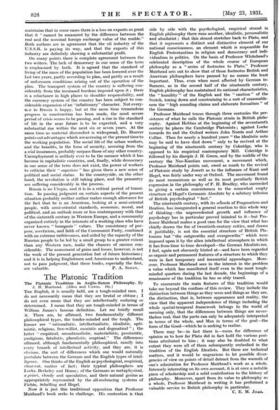The Platonic Tradition The Platonic Tradition in Anglo-Saxon Philosophy. By
J. H. Muirhead. (Allen and Unwin. 16s.) TUE English, it is usually held, are a tough-minded race. I do not necessarily mean that they are brutal or obtuse ; I do not even mean that they are intellectually enduring or determined. I mean that they are tough-minded in terms of William James's famous definition. Let me briefly recall it. There are, he affirmed, two fundamentally different philosophical types, the tender-minded and the tough. The former are " rationalistic, intellectualistic, idealistic, opti- mistic, religious, free-willist, monistic and dogmatical " ; the latter " empirical, sensationalistic, materialistic, pessimistic, irreligious, fatalistic, pluralistic, sceptical." The differences affirmed, although fundamentally philosophical, ramify into every branch of intellectual activity, and they are, it is obvious, the sort of differences which one would naturally postulate between the German and the English types of intel- ligence. One thinks of the English as psychological, empirical, clear-cut, matter of fact; their typical philosophers are Locke, Berkeley and Hume ; of the Germans as metaphysical, a priori, cloudy and speculative, and their natural genius as appropriately represented by the all-embracing systems of Fichte, Schelling and Hegel.
Now it is just this traditional opposition that Professor Muirhead's book seeks to challenge. His contention is that
side by side with the psychological, empirical strand in English philosophy there runs another, idealistic, personalistic and absolutist ; that this strand stretches back to Plato, and that it represents a distinct and distinctive element of our national consciousness, an element which is responsible for English Protestantism in religion and democracy and indi- vidualism in politics. On the basis of Professor Whitehead's celebrated description of the - whole course of European philosophy as a " series of footnotes to Plato," Professor Muirhead sets out to show that of those footnotes British and American philosophers have penned by no means the least
important. Thus, even when most affected by German in-
fluences, as in the second half of the nineteenth century, English philosophy has maintained its national characteristics, the " humility " of the English and the " caution " of the Scotch, toning down and constraining to a sort of reasonable- ness the " high sounding claims and elaborate formalism " of the Germans.
Professor Muirhead traces through three centuries the per- sistence of what he calls the Platonic strain in British philo- sophy. Against Hobbes at the beginning of the seventeenth century he places the Cambridge Platonists ; against Locke towards its end the Oxford writers John Norris and Arthur Collier. Then for nearly a hundred years " the idealistic note may be said to have died down " only to be revived at the beginning of the nineteenth century by Coleridge, who is opposed to his empirical contemporary Mill. Coleridge is followed by his disciple J. H. Green, and by the middle of the century the Neo-Kantian movement, a movement which, Professor Muirhead points out, owed as much to the revival of Platonic study by Jowett as to the influence of Kant and Hegel, was fairly under way at Oxford. The movement found its most momentous as well as its most peculiarly British expression in the philosophy of F. H. Bradley, who succeeded in giving a certain concreteness to the somewhat empty structure of Hegel's Germanic Absolute by a salutary infusion of British psychological " fact."
The nineteenth century, with its schools of Pragmatism and Realism, has inaugurated a general reaction to this whole way of thinking—the unprecedented growth and influence of psychology has in particular proved inimical to it—but Pro- fessor Muirhead makes a good case for the view that what has chiefly drawn the fire of twentieth-century critics, and drawn it justifiably, is not the essential structure of British Pla- tonism but "the outgrowths and overgrowths" which were imposed upon it by the alien intellectual atmosphere in which it has from time to time developed—the German Idealists are, I feel, again not obscurely hinted at—and have been regarded as organic and permanent features of a structure to which they were in fact temporary and inessential appendages. More- over, Professor Muirhead sees in the interest in the problem a value which has manifested itself even in the most tough- minded quarters during the last decade, the beginnings of a renaissance of the tradition he has so ably traced.
To enumerate the main features of this tradition would take me beyond the confines of this review. They include the distinction between things as they seem and things as they are, the distinction, that is, between appearance and reality, the view that the apparent independence of things including the whole spatial-temporal framework belongs to the world of seeming only, that the differences between things are never- theless real, that the parts can only be adequately interpreted in terms of the whole, and Man in terms of the goal—the form of the Good—which he is seeking to realize.
There may be—in fact there is—room for difference of opinion as to how far Plato did in fact hold the various posi- tions attributed to him ; it may also be doubted to what extent they were all of them subsequently embodied in the tradition of the English Idealists. But these are technical matters, and it would be ungracious to let possible diver- gencies of view on points of detail detract from the warmth of one's admiration for Professor Muirhead's work as a whole. Intensely interesting on its own account, it is at once a notable piece of scholarship and.a solid contribution to the history of philosophy. Moreover, apart from its value to philosophy as a whole, Professor Muirhead in writing it has performed a valuable service to British philosophy in particular.
C. E. M. JOAO.






































 Previous page
Previous page